
co-organiser; N. Briceño; P. Mussetta, co-org.; A. Zuniga, co-org.; A. Peña;
K. Sandoval; C. Saldías; F. Martín, co-org.; M. Salomón, co-org.; A. Álvarez).
On 3-6 August 2016, IWSN supported the International Water Governance Workshop in Mendoza, Argentina.
The event was organised by the IWSN team at University of Arizona (UA), in collaboration with the Departamento General de Irrigación (DGI) – the water agency of the province of Mendoza, Argentina – and IWSN partners from CONICET (the Argentine national science agency, in particular, at INCIHUSA, the Institute of Human, Social and Environmental Sciences). Improving water governance, the theme of the workshop, provides an effective approach for achieving water security.
The event included an opening-day public conference that drew some 200 attendees from the academic and professional communities and the general public in Mendoza. The subsequent two-day workshop was open to water professionals, researchers and students from across the Americas.
 The selection process
The selection process
With IWSN and DGI support, we provided five scholarships to water professionals from Latin America to attend the workshop. In order to select the scholarship recipients (or becarios, in Spanish), we organised a contest that was announced widely throughout the Americas using our own networks and our networks’ networks. We launched the contest on 1 May 2016, with an application deadline of 30 May.
We had an astonishing response! We received 63 applications from 11 Latin American countries! We formed a review committee comprising one member from each of the cosponsoring organisations including the UA, the DGI, CONICET, UNESCO’s International Hydrological Programme (IHP), and the Universidad del Litoral, in Santa Fe, Argentina. The applications were carefully reviewed and scored by each committee member independently, using a standardised rubric for evaluation. The committee selected five candidates from five different countries. The winning becarios, who were notified on 15 July, were Alejandra Peña from Mexico, Krissel Sandoval from Panama, Ninoska Briceño from Venezuela, Arles lvarez from Honduras, and Cecilia Saldías from Bolivia.
Soon after we announced the results, we started the purchase of their plane tickets to Mendoza, and their hotel reservations.

C. Saldías, N. Briceño; A. Álvarez).
The joys of travel
Getting to Mendoza from all of these countries was quite a challenge. Some of the becarios had to take several planes, change airports, or spend the night in another city. Two had to leave home one day earlier in order to be in Mendoza on 2 August, ready to start the workshop early the following day. Trips were complex enough already, but they became even more complicated when one of the travellers was informed he needed a yellow fever vaccine before he could be permitted to board his flight. One had to miss the first day of the workshop due to flight delays, while another arrived without a suitcase, which was delivered three days later to our hotel in Mendoza.
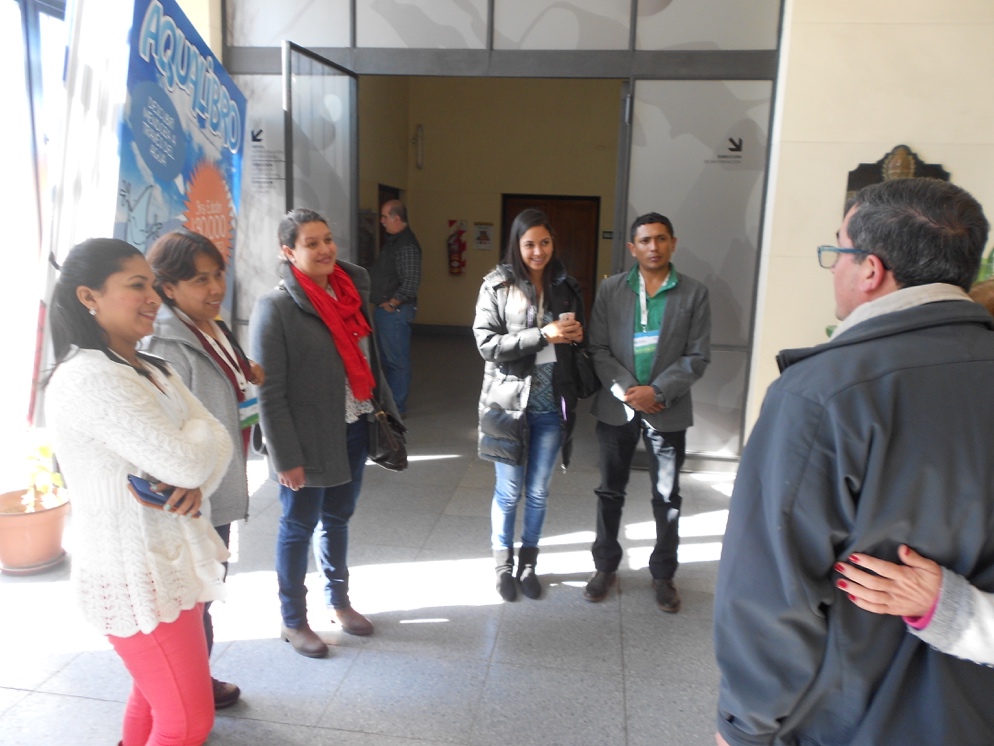
Management, Mario Salomón
The Water Governance Workshop
Finally, all of the becarios arrived to Mendoza and actively participated in the workshop. At the end of each day, they were asked to reflect on what they learned and share their thoughts with the audience. In addition, on the third day of the workshop, the Superintendent of the DGI, José Luis Álvarez, kindly invited them to lunch at the DGI facilities, where he and his team presented a special session on what the DGI does and how it operates. You can read more about this visit (in Spanish) here.
The group of becarios learned from the water professionals in Mendoza about effective ways to manage water and educate the public on water conservation and the importance of maintaining the canals free of trash. The DGI maintains an impressive education campaign implemented in elementary schools, because young children are often able to educate their parents. After lunch, the invitees shared their own ideas along with the water-related challenges in their home countries.
The becarios
The group of becarios soon became an important part of the workshop because we also learned from them by listening to their reflections at the end of each day. Below is a short essay that each wrote about their experiences in this workshop.
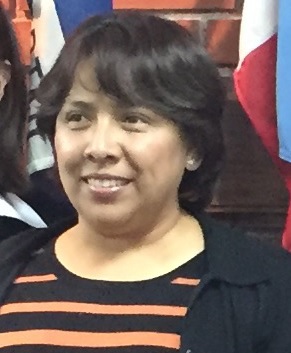 Alejandra Peña, from Mexico
Alejandra Peña, from Mexico
I am a geographer with a master’s and a Ph.D., both in geography. For the past 10 years, I have conducted research on water-related topics. I am currently working at the Instituto Mexicano de Tecnología del Agua (Mexican Technological Institute of Water, IMTA) and I am a Lecturer for the Geography program at the Universidad Autónoma de México (Autonomous University of Mexico, UNAM). At IMTA I work in the hydrology department, where I collaborate in consulting projects that involve research on the hydrometeorological extreme events (droughts and floods).
From my participation in the workshop, I appreciated the wide variety of perspectives, both theoretical and practical, on water governance that were shared during the presentations. The social interactions with colleagues who are experts from diverse disciplines in water governance and water security, underlined the importance of working in interdisciplinary teams to conduct research projects. The national situations of the Latin American countries that were represented in the workshop are somehow similar, which is why it is important to maintain correspondence with the other participants – it is very helpful to share information, conduct research together, and learn from one another. The case studies presented here were very valuable to me because these revealed findings that can be replicated and adapted to water-security-related issues in my country. In 2017, IMTA will launch a water security program, in which I will be able to implement some of the lessons learned from this workshop.
The city of Mendoza is very pleasant and I enjoyed my time there very much. The food, climate and, above all, the people surpassed my expectations. The hotel was very comfortable and well located, and CONICET facilities were very appropriate for the event. The people were incredibly warm to us. The organisers of the event were attentive to every detail so that the workshop ran smoothly. I appreciate the generosity of the IWSN and the DGI, and I admire their professionalism.
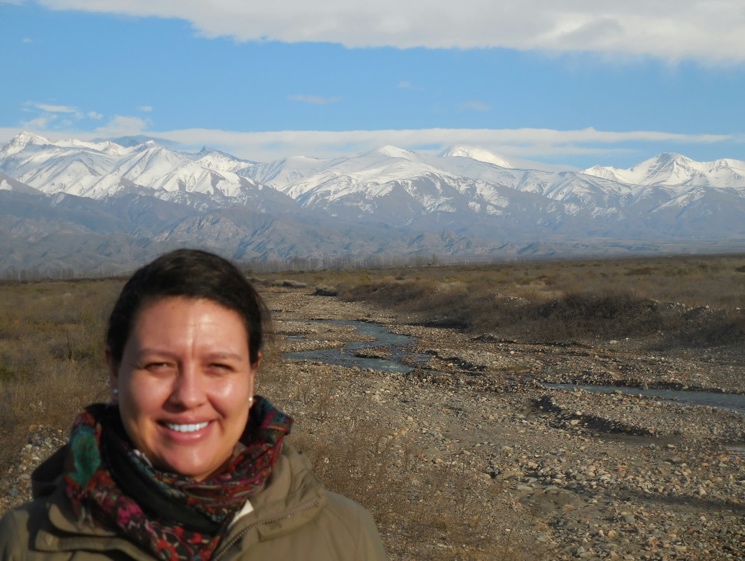 Cecilia Saldías, from Bolivia
Cecilia Saldías, from Bolivia
Hi! I have a background in civil engineering with a master’s in land and water management from the University of Wageningen in the Netherlands, and a doctoral degree in applied biology, specifically regarding water and land management, from Ghent University in Belgium. Currently, I work as an independent consultant. My areas of interests include integrated management of water basins, wastewater reuse, water governance and the water-energy-food nexus.
I participated in this water governance workshop thanks to a scholarship given by the Udall Center for Studies in Public Policy at the University of Arizona, with funding from the IWSN, and in collaboration with the DGI, INCIHUSA–CONICET, UNESCO-IHP, and the Flemish government. I am very happy to have been given this opportunity because I have learned a lot about water governance in Latin America. The presentations made by our colleagues were very enriching, and allowed intense learning through the different shared experiences. I am confident that the discussion sessions have shed light on potential solutions, and at the same time have posed more questions on the topic. Likewise, I believe this event allowed us to establish relationships with water professionals in different regions, which in turn, strengthened our water networks.
I would like to take this opportunity to thank the organisers and our hosts for their great energy and kindness, making us feel like we were at home. I am sure I will keep you in my memory. See you next time!
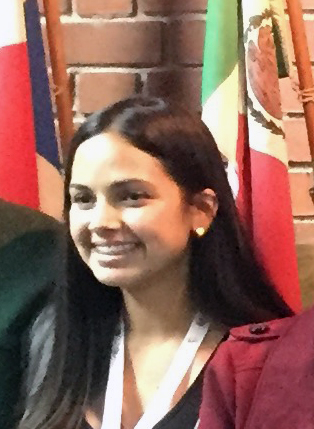 Ninoska Briceño, from Venezuela
Ninoska Briceño, from Venezuela
I am an engineer in hydrometeorology from the University of Central Venezuela. Since 2014, I have been working at the Instituto Nacional de Meteorología e Hidrología (National Institute of Meteorology and Hydrology, INAMEH), which is a governmental organisation that disseminates hydrological and meteorological information in Venezuela in a reliable and timely manner. My professional interests are linked to hydrology and I am currently helping to coordinate a project on hydrological forecasting, where I manage a pilot project on early-alert flood systems.
With regards to my participation in the workshop, I am very grateful because I was able to share this event with professionals of such high academic level. This was a very complete workshop that, through the various presentations, allowed me to integrate water-security topics with water-demand management. The presenters explained basic concepts including vulnerability and land-use planning, but also examined specific case studies including the Mendoza 2020 Water Plan, the real-time measurment of canals, an adaptation plan for the Maipo (MAPA) project in Chile, and a proposed desalination plant for Puerto Peñasco in Mexico. These case studies from different countries allowed us to learn from actual findings. They also concerned important topics such as legal and institutional frameworks and professional ethics.
This experience provided valuable lessons for the institution that I represent. For example, the methods to develop plans based on strategic diagnosis, with the application of adequate policies and the evaluation of possible scenarios, with the goal of assessing risk. This can help social, economic and environmental development in Venezuela.
I think Mendoza is a very pretty city, tranquil, and ordered, with very kind wine-drinking people, but the weather was very cold for me [August is mid-winter in the Southern Hemisphere]. The field trip to the nearby Tupungato region of the Andes was a great experience, with marvellous landscapes that I will never forget.
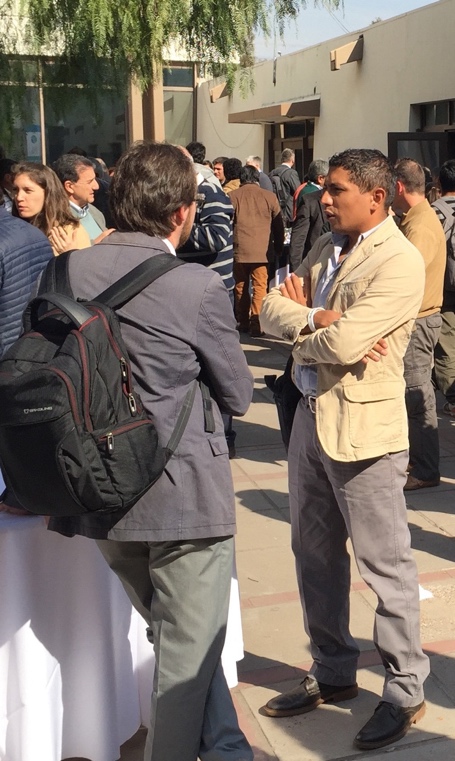 Arles Álvarez, from Honduras
Arles Álvarez, from Honduras
First of all, I want to thank all those who provided me the opportunity to participate in this workshop. It was a great experience to be able to acquire the knowledge that the presenters shared. I related all of this learning to the activities I do in my work, which includes the establishment, strengthening, and continuation of watershed councils, and groundwater governance through regulation of usage, and drought and desertification in Honduras.
I was very impressed by the governance processes that are implemented in Mendoza by the DGI. This was a very interesting experience. I marvelled at the warmth and attention that the DGI personnel and the different irrigation districts showed to us. They generously hosted a couple of dinner events where we shared our experiences and their history. In one of these dinners, there was a musical group that played local music and gave a wonderful show. Also, it was very nice for me to feel the cold weather.
I will try to apply the lessons learned to Honduras, particularly within the watershed councils, which I believe would be a great improvement for water governance in Honduras. I believe that, thanks to the knowledge I acquired, my participation in this workshop will help me in the future. But above all, I value having shared wonderful experiences and started new friendships, which will allow me to stay in touch and ask further questions in order to improve my work and, subsequently, water governance and water security in Honduras.
I am very grateful to all of the people who made my participation possible and I say goodbye, hoping to continue the conversation. Cheers!
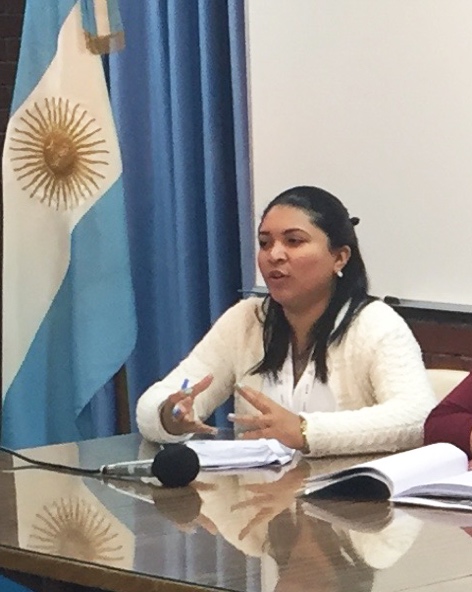 Krissel Sandoval, from Panama
Krissel Sandoval, from Panama
I am an engineer in environmental and watershed management, and I work as a technician on water resources in the environmental ministry of Panama, in the Directorate of Integrated Watershed Management.
Panama has a tropical climate; it is hot and humid. This is very different from Mendoza, Argentina, which is a region with very little precipitation. Participating in the water governance workshop was a very pleasant experience for me. As a becaria, I was able to gain knowledge that I expect to replicate in my institution. We currently have a national plan called “Agua para Todos” (“Water for Everyone”) that contains adaptation strategies against the El Niño phenomenon. This event is related to severe droughts and a decrease in the environmental flow of the rivers. The plan includes educational components aimed at promoting environmental education, with a goal of securing water in good quantity and quality at the national level. These are our challenges.
The experience I gained here includes knowing about good water governance that includes distributing this resource to the population in their different sectors in sufficient quantity and good quality. Through the exchange of ideas and knowledge and the presentation of different case studies, we hope to be able to replicate successful strategies in our home countries.
During the field trip to Tupungato, I learned how people can empower themselves and work together so that their irrigation infrastructure can work effectively, which benefits everybody. Their water-management approach offers an example that we would like to implement in our countries. Tupungato gave me the sense that it is a community where you can walk freely and feel within a family. The warmth of the people was evident in some of the conversations and in their hospitality and willingness that all of us should take a little something of Mendoza.
I was impressed to see the Andes Mountains! I had never been so close to snow and feel such cold temperatures. Breathing the fresh air and feeling the clear water in the cold weather, I felt at peace and relaxed.
